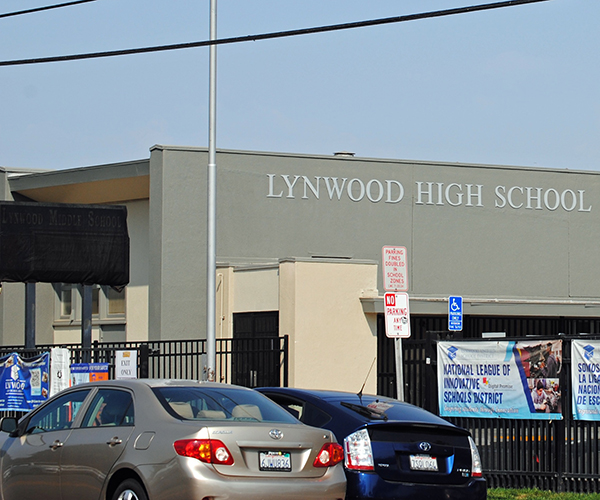By Alfredo Santana
Contributing Writer
LYNWOOD — Teachers in the Lynwood Unified School District are pressing the board of education to raise their wages up to 14%, and add full payment of health care policies for their families to the bargaining agreement.
So far, the district’s counteroffer to the Lynwood Teachers Association, the union representing the teachers, includes a salary raise of 5%, or about $6.5 million in additional funds to pay for increased wages.
District Superintendent Gudiel Crosthwaite said in a video that he is not part of the collective bargaining process, but the district assembled a bargaining team to negotiate a new contract with union representatives.
Although they have not reached common ground on salaries and health care coverage, Crosthwaite announced on April 4 that both parties met seven times this year, and have reached several agreements “on different issue and concerns related to the contract,” among them less students per classroom.
He said that the average salary of district teachers is $90,000 a year, plus $28,000 in benefits, and offered an additional 2% increase to those who provide additional services to students.
The superintendent did not mention what other services are offered to students.
“This is the only way that we can offer anything beyond the 5%,” Crosthwaite said.
For the 2022-2023 academic year, the school district adopted a $278 million budget, and projects to spend $286.5 million and run a deficit of $8.5 million.
Gretchen Janson, assistant superintendent of business services, said the school district faces a challenging economic outlook due to the state’s funding formula that weighs in the number of students enrolled each academic year.
The aftermath of the COVID-19 pandemic, combined with a wave of residents who moved out of California since 2020 and families having fewer children has reduced student enrollment in many school districts in Southern California.
Lynwood Unified is no an exception.
In the 2021-2022 school year, Lynwood reported a student population of 12,667, while it estimates to have an average daily attendance of 11,164 in 2023-2024.
“When enrollment goes down and attendance is low, schools receive less funding,” Jansen said. “Lynwood is currently experiencing declining enrollment. We have fewer students in our schools.”
At a virtual presentation held last month, Janson indicated that 37.5% of the district’s budget is allocated to teacher salaries, 15.2% cover classified staff wages, and 21.1% pay for benefits.
The sum of the three expenses amount to nearly 74% of the entire operative budget being disbursed on teachers, staff salaries and their benefits, she concluded.
Teachers in Lynwood Unified receive compensation based on their education and level of experience.
For example, a teacher with a bachelor’s degree, a teaching credential but with no experience earns a starting salary of $55,468, while the most experienced teachers with 20 years of experience, a doctorate degree plus teaching credentials earns $105,000.
In academic year 2021-2022, the district had 13 teachers with doctorate degrees, 513 with master’s degrees and 30 upper division graduate units, 167 with master’s degrees, 118 with bachelor’s degrees along with 30 upper division graduate units, and 58 with only bachelor’s degrees.
The Lynwood Teachers Association is composed of 900 members that include teachers and educational support staff.
Brian Lucas, the assistant superintendent for human resources, cited data from the Los Angeles County Office of Education that indicates the district pays wages above the median salary of $52,581 to beginning teachers.
“We pay our teachers in the 14th out of 44 districts,” Lucas said. “You can see we are paying above the median.”
Teachers say they have worked without a contract for nearly a year and have staged pickets outside schools and posted messages on Instagram encouraging followers to contact Crosthwaite to support their plight.
“LUSD refuses to invest enough to recruit and retain teachers your students deserve,” a letter with LTA letterhead dated on March 29 read. “LUSD refuses to make your child, their teachers and their schools a priority. Lynwood teachers are some of the lowest paid teachers compared to our immediate surrounding districts.”
Marco Tostado, a special education teacher at Washington Elementary School for 29 years, said at a recent school board meeting that teachers are underpaid compared to colleagues in Downey, Paramount and Montebello.
He also slammed the district for not offering healthcare benefits to its employees.
“My question to the board and superintendent is why,” Tosdado told the audience. “All schools use the same formula to budget based on enrollment and to say we have declining enrollment is interesting. Are you telling me Lynwood is the only district experiencing declining enrollment? All school districts in Southern California are experiencing the same decline.”
He asked the school board and the superintendent to redo a budget analysis to detect excess expenditures, and prioritize teachers’ wages.
“How can you expect us to carry on?” Tostado asked. :We feel like we are suffocating from poor treatment. We’ve been treated like second-class teachers. We are expected to do more and help our students succeed but with no support from our management.”
Margeret Foltz, a teacher who was hired in 1991, complained that nearby districts offer $20,000 or more to teachers than what they make at Lynwood Unified, in addition to better benefits.
According to Transparent California, Foltz had a salary of $100,000 in 2021, and earned nearly $138,000 that year if benefits and additional payments are included.
“When I came to this district, Lynwood teachers were in the top half of this county. Now we are in the sewer,” Foltz said.
In case negotiations stall, an impasse will be declared and a mediator would be brought in to study the facts, Crosthwaite said.
“For us to give out 14%, that would bankrupt Lynwood Unified School District. We would not be able to verify and provide evidence that we can pay our employees and our bills for the next three years,” Crosthwaite said.












